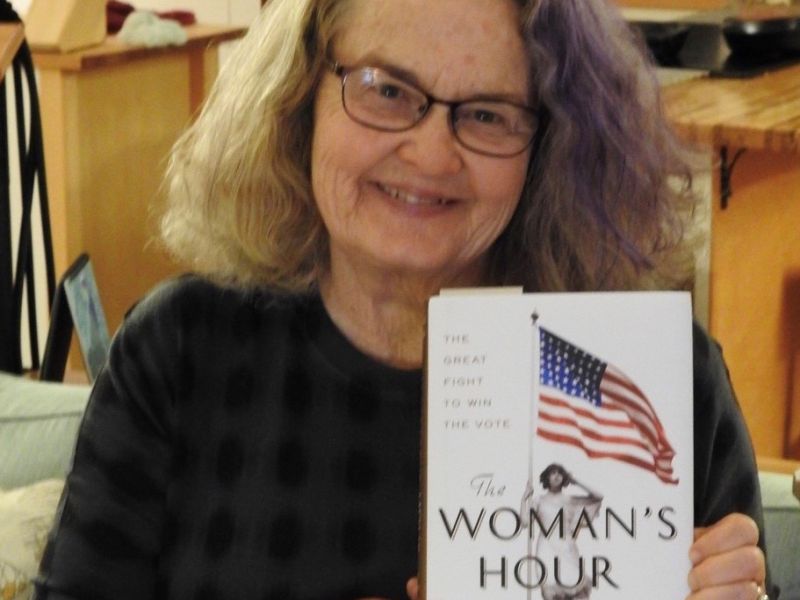The Woman’s Hour: The Great Fight to Win the Vote by Elaine Weiss is that rare book – a non-fiction page turner made even more remarkable because everyone knows that the 19th Amendment, that one important sentence that gave women the right to vote, was ratified.
I thought I was familiar with the history of suffrage in the United States. But, this book made me realize that I knew nothing about the final push for ratification or how close the amendment came to defeat.
Weiss’s book is painstakingly researched. Her mastery lies in taking an incredible amount of information about the train of events, including a cast of dozens, and writing a suspenseful tale. When I was given this book as a gift, my goal was to read one chapter every few days. History books are seldom cliff hangers, but this one is. Once I started reading, I could not put it down. I immediately asked the Atheneum to get a copy as well and encouraged the Book Festival to invite Elaine to Nantucket. I am thrilled that she was able to fit us into her busy schedule.
Thirty-six states were needed to ratify the 19th Amendment. By the mid-summer of 1920, 35 states were in hand, but the 36th proved elusive. Eight states had rejected it, and three refused to even consider it. It was no surprise that nearly every previously Confederate state had failed to ratify the amendment, but, surprisingly, the anti-Suffragists had victories in the Northeast. They stymied ratification in Vermont, New Hampshire, Connecticut and Delaware. North Carolina was up in the air, but sure to reject it. This left Tennessee as the possible 36th, the last hope for ratification. It was an unlikely state. The Pros and Antis descended on Nashville in droves hoping their views would prevail. The tension in the story is palpable as the sides lined up for a six-week battle in Nashville.
Weiss writes, “The conflict quickly devolved into a vicious face-off, brimming with dirty tricks and cutting betrayals, sexist rancor, racial bigotry, booze, and the Bible, with the ghosts of the Civil War hovering over the proceedings….The outcome remained in doubt until the very last moment.”
Race plays a crucial part in the history of voting rights. After the Civil War, the 15th Amendment gave black men the vote, a decision that split the suffrage movement of that era with a significant portion of white suffragists unwilling to see black men get the vote before women. That was, as Frederick Douglass said, the black man’s hour. A similar split of the suffrage movement took place during ratification of the 19th Amendment.
Some Anti-Sufs, as they were called, warned that granting black women the vote was a prelude to intermarriage. The accusation alarmed some Suffragists who tried to assure the people of Tennessee that it such was not their intent. Carrie Chapman Catt, the leader of the National American Woman Suffrage Association, distanced herself “from the ideal of true equality in pursuit of the franchise.” Her group did not want the issue of race to scuttle ratification. As the vote got nearer, the Antis played the race card more stridently, warning that a Race War would erupt if suffrage became law.
The dirty tricks and skullduggery employed in the battle to defeat women’s suffrage make for riveting reading. For instance, the liquor lobby spent lavishly against the woman’s vote because women were more likely to support temperance than men. Despite the fact that Tennessee had been legally “dry” since 1909, there was a busy Jack Daniels speakeasy suite on the 8th floor of Nashville’s main hotel where they tried to persuade legislators why suffrage was bad for the state.
This is a book that will keep you reading. It reminds us why voting rights mattered then and matter now. Weiss dedicates The Woman’s Hour to her parents who “took their little girl into the voting booth, let her pull the magic curtain, and taught me to treasure my right to vote.”
Pick up The Woman’s Hour and attend Weiss’s presentation at the Nantucket Book Festival. It promises to be entertaining. Finally, do not think that The Woman’s Hour appeals only to women.
Please support the Nantucket Book Festival’s quest to keep most of its events free to the public by making a donation today. As history is my field, I hope your donation will enable them to invite more historians to the Festival.
